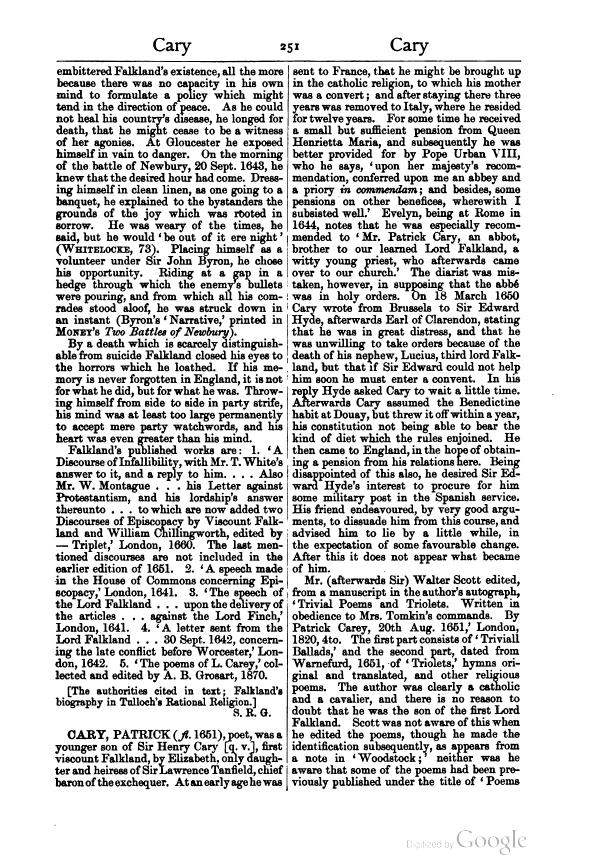embittered Falkland's existence, all the more because there was no capacity in his own mind to formulate a policy which might tend in the direction of peace. As he could not heal his country's disease, he longed for death, that he might cease to be a witness of her agonies. At Gloucester he exposed himself in vain to danger. On the morning of the battle of Newbury, 20 Sept. 1643, he knew that the desired hour had come. Dressing himself in clean linen, as one going to a banquet, he explained to the bystanders the grounds of the joy which was rooted in sorrow. He was weary of the times, he said, but he would ‘be out of it ere night’ (Whitelocke, 73). Placing himself as a volunteer under Sir John Byron, he chose his opportunity. Riding at a gap in a hedge through which the enemy's bullets were pouring, and from which all his comrades stood aloof, he was struck down in an instant (Byron's ‘Narrative,’ printed in Money's Two Battles of Newbury).
By a death which is scarcely distinguishable from suicide Falkland closed his eyes to the horrors which he loathed. If his memory is never forgotten in England, it is not for what he did, but for what he was. Throwing himself from side to side in party strife, his mind was at least too large permanently to accept mere party watchwords, and his heart was even greater than his mind.
Falkland's published works are: 1. ‘A Discourse of Infallibility, with Mr. T. White's answer to it, and a reply to him. … Also Mr. W. Montague … his Letter against Protestantism, and his lordship's answer thereunto … to which are now added two Discourses of Episcopacy by Viscount Falkland and William Chillingworth, edited by—Triplet,’ London, 1660. The last mentioned discourses are not included in the earlier edition of 1651. 2. ‘A speech made in the House of Commons concerning Episcopacy,’ London, 1641. 3. ‘The speech of the Lord Falkland … upon the delivery of the articles … against the Lord Finch,’ London, 1641. 4. ‘A letter sent from the Lord Falkland … 30 Sept. 1642, concerning the late conflict before Worcester,’ London, 1642. 5. ‘The poems of L. Carey,’ collected and edited by A. B. Grosart, 1870.
[The authorities cited in text; Falkland's biography in Tulloch's Rational Religion.]
CARY, PATRICK (fl. 1651), poet, was a younger son of Sir Henry Cary [q. v.], first viscount Falkland, by Elizabeth, only daughter and heiress of Sir Lawrence Tanfield, chief baron of the exchequer. At an early age he was sent to France, that he might be brought up in the catholic religion, to which his mother was a convert; and after staying there three years was removed to Italy, where he resided for twelve years. For some time he received a small but sufficient pension from Queen Henrietta Maria, and subsequently he was better provided for by Pope Urban VIII, who he says, 'upon her majesty's recommendation, conferred upon me an abbey and a priory in commendam; and besides, some pensions on other benefices, wherewith I subsisted well.' Evelyn, being at Rome in 1644, notes that he was especially recommended to 'Mr. Patrick Cary, an abbot, brother to our learned Lord Falkland, a witty young priest, who afterwards came over to our church.' The diarist was mistaken, however, in supposing that the abbé was in holy orders. On 18 March 1650 Cary wrote from Brussels to Sir Edward Hyde, afterwards Earl of Clarendon, stating that he was in great distress, and that he was unwilling to take orders because of the death of his nephew, Lucius, third lord Falkland, but that if Sir Edward could not help him soon he must enter a convent. In his reply Hyde asked Cary to wait a little time. Afterwards Cary assumed the Benedictine habit at Douay, but threw it off' within a year, his constitution not being able to bear the kind of diet which the rules enjoined. He then came to England, in the hope of obtaining a pension from his relations here. Being disappointed of this also, he desired Sir Edward Hyde's interest to procure for him some military post in the Spanish service. His friend endeavoured, by very good arguments, to dissuade him from this course, and advised him to lie by a little while, in the expectation of some favourable change. After this it does not appear what became of him.
Mr. (afterwards Sir) Walter Scott edited, from a manuscript in the author's autograph, 'Trivial Poems and Triolets. Written in obedience to Mrs. Tomkin's commands. By Patrick Carey, 20th Aug. 1651,' London, 1820, 4to. The first part consists of 'Trivial Ballads,' and the second part, dated from Warnefurd. 1661, of 'Triolets,' hymns original and translated, and other religious poems. The author was clearly a catholic and a cavalier, and there is no reason to doubt that he was the son of the first Lord Falkland. Scott was not aware of this when he edited the poems, though he made the identification subsequently, as appears from a note in 'Woodstock;' neither was he aware that some of the poems had been previously published under the title of 'Poems
